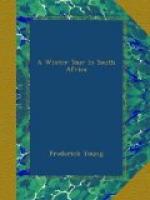Africa were doing for themselves, and confess
I was amazed when I saw the great docks, by means of
which the commerce of South Africa is being encouraged,
and by which it will hereafter be developed.
I was impressed, too, with the educational institutions,
the great Public Library, worthy of any town,
the South African Museum, the South African College,
and the various efforts made to bring the newest
and best knowledge home to the people. But
perhaps in Cape Town, the thing which impressed me
as most curious was the new dock, in process of
construction by excavating stone for the breakwater
and other purposes. This work was carried
on by coloured convict labour. The convicts thus
become trained in useful manual work, as well
as in habits of obedience, and when they are
discharged, are not only better men, but people in
whose work employers of labour have confidence.
I learned that the great public mountain roads
in Cape Colony have thus been constructed by
convict labour, at a comparatively small cost, while
the convict acquires skill and useful training.
Going up country, my attention, among other matters,
was turned to the distribution of mineral wealth
and difficulties of water supply, for, as Sir Frederick
Young has remarked, the water supply is one of the
great problems which all persons have to consider
in South Africa. The season during which
rain falls is short, and the rain drains rapidly
down comparatively steep inclined surfaces, so that
science of many kinds has to be enlisted to conserve
the water, and turn the supply to account.
I found the rocks of much of the country have
been curiously compressed and hardened and thrown into
parallel irregular folds, and that these rocks
were afterwards worn down by the action of water,
at a time when the land was still beneath the
ocean, with the result that many basin-shaped depressions
are preserved and exposed, each of which holds a certain
amount of water. Just as we never dream of putting
down a well in this country without knowing the
positions of the water-bearing strata, so it
is hopeless to bore profitably for water in the
Colony till the districts are defined over which the
water-bearing basins are spread. Nothing
arrests the escape of water in its course through
the rocks more efficiently than intrusive sheets
of igneous rock which rise to the surface, but until
the distribution of these dykes is systematically recorded
it will not be possible to open out all the water
which is preserved underground. There is
no doubt that by utilising geological facts of
this nature, a better water supply may be obtained,
which will enable more land to be brought under
cultivation, and larger crops to be raised.
I may say that the Colonial Government is fully aware
of the importance of following out such lines
of work, and steps are being taken to give effect
to such exploration. Vegetation, however,
by its radiating power, must always be one of the chief
aids to improved water supply. In the matter




